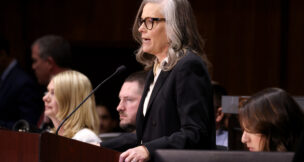State universities comply with Trump order banning DEI programs, policies
Jamar Younger Arizona Capitol Times//July 19, 2025//
State universities comply with Trump order banning DEI programs, policies
Jamar Younger Arizona Capitol Times//July 19, 2025//
Key Points:
-
Arizona universities ditch DEI programs after pressure from Feds
-
Top GOP officials in AZ also sent a warning to universities to comply
-
Student, faculty and campus worker groups protesting change
Arizona’s public universities have faced increased pressure in recent months to comply with mandates from President Donald Trump’s administration and state Republican lawmakers to end Diversity, Equity and Inclusion (DEI) initiatives at each university.
Trump issued an executive order in January targeting DEI programs at colleges, universities and government agencies that receive federal funding. To support those efforts, state Republican lawmakers introduced various bills intended to end DEI practices at those institutions.
Sen. David Farnsworth, R-Mesa, introduced Senate Bill 1694, which would have withheld state funding from colleges and universities offering courses that promoted DEI. Another measure, House Bill 2868, sponsored by Rep. Michael Way, R-Queen Creek, would’ve prohibited universities and community colleges from establishing DEI offices.
Gov. Katie Hobbs vetoed both measures.
Despite the vetoes, the universities still faced scrutiny from state lawmakers who urged the institutions to comply with the federal directives.
Senate President Warren Petersen sent a letter to the universities in February, requesting that each institution review its DEI policies, make any necessary changes, and publicly release a plan outlining how each university was complying with the mandates.
The letter stated that it was in the best interest of each university to comply with the order to avoid the risk of any “unwanted regulatory attention.”
Petersen then met with representatives of the U.S. Department of Education in April to discuss how the state’s three public universities were complying with the federal government’s mandate.
At the time, Petersen said he was encouraged by actions taken by the University of Arizona, but wasn’t satisfied with the response from Arizona State University and Northern Arizona University.
Petersen held the same sentiment during a recent interview, praising the UofA for its efforts.
“UofA, of the three, were really the only ones that I had felt like … made good faith efforts,” Petersen said.
On April 9, Petersen posted a letter on his X account from University of Arizona President Suresh Garimella, who shared an update describing how the university was complying with Trump’s executive order.
According to the letter, the university removed diversity and inclusion language from its Land Acknowledgement, which appeared on all of its websites, and took down the website for its Office of Diversity and Inclusion. The university also removed its diversity and inclusion statement, which was previously included on each job posting.
In addition, administrative units and staff at the university initiated the process of discontinuing “preferential treatment” activities within those units, and college deans were directed to implement changes to activities impacted by Trump’s executive order.
In May, the university announced that it was integrating its cultural resource centers that served students from diverse backgrounds into a Student Culture and Engagement Hub.
That decision drew backlash from the Coalition to Protect Students and Workers, as well as other campus groups, which protested against the consolidation of the centers and other anti-DEI measures enacted by the university.
ASU and the Board of Regents, which serves as the governing board for the state’s public universities, have also taken steps to comply with the federal mandate.
ASU officials didn’t provide specifics, but a university spokesman said the university “is complying with all executive orders as they are issued and as they are considered by the courts.”
The spokesman said in a statement that the university was already complying with a provision passed by voters in 2010 that banned affirmative action. The university also abides by its charter, which states that ASU is “a comprehensive public research university, measured not by whom it excludes, but by whom it includes and how they succeed.”
The Board of Regents approved policy updates last month that remove outdated references to revoked federal requirements and provide clearer descriptions of the board’s continued compliance with laws prohibiting discrimination, according to a board spokesman.
Northern Arizona University didn’t respond to a request for comment.
While the universities have faced increased scrutiny from federal and state officials, the institutions have also received criticism from students, faculty and staff who say ending DEI programs will hurt students from marginalized backgrounds.
“This is affecting the specific targeted resources that these people could benefit from,” said Alberto Plantillas, central regional director for the Arizona Students’ Association, and a graduate student at ASU. “I think that’s one of the worst parts of this, and UofA is just copying what ASU has been doing for the last five, six years.”
Plantillas has spoken out against the DEI changes at the Board of Regents meetings and testified against SB1694 at a Senate Education Committee hearing in February.
Plantillas compared UofA’s recent actions to ASU, which he says has been targeting student clubs, removing inclusive spaces and not communicating with student groups. The changes are part of a larger shift that has created a more hostile environment for marginalized students, international students and students who are lacking permanent legal status, he said.
“The conservative policies on campus are starting to align more closely with the federal government’s policies. And, to me, it really seems like they’re kind of caving in to a lot of these things so they’re not targeted in the future,” he said. “And I think that’s just a very bad position for universities to be at.”














































